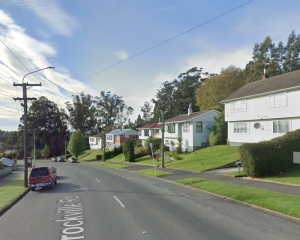''Recognition is the first step in legitimisation. There's still other specialists around who say: `Oh, there's no need for that, we look after pain ourselves'.''
Resources for chronic pain - Dr Jones prefers the term persistent - are limited, doctors lack knowledge, and patients often get wrong or contradictory advice.
Awareness of chronic pain had been emerging on the radar of health administrators as the indirect costs of pain were being recognised.
It was a ''long road'' to acceptance by the Medical Council.
''They put us through a fairly tight hoop. There's not been any mateship, I can tell you.
''However, they have a role to protect the public, so they were especially interested that we had adequate processes to ensure maintenance of professional standards for our fellows, an area in which we can all lift our game.''
He hoped recognition was another step on the way to increasing resources for pain medicine.
A key task was educating doctors, both those in practice and those in training.
Pain medicine was given ''one afternoon'' in fifth-year clinical medicine and, for some, a little bit of on-the-job work with anaesthetists.
Most persistent pain management was left to GPs, who did not have sufficient training.
Drugs were inappropriately or poorly prescribed, particularly opioids and benzodiazepines, which were both addictive.
What medical school failed to teach was the body's sophisticated pain-suppression system, which could be stimulated by exercise.
''Move, move and move'' was one of Dr Jones' favourite prescriptions.
Dr Jones has a lot of time for therapies such as yoga, mind focus, improving sleep quality and not using pain to limit activity levels.
He is interested in the psychology of pain. It was ''rubbish'' to assume a focus on psychological elements meant denying the reality of pain, he said.
''I think pain's part of life.
''Resting, or falling into the take-it-easy trap, does not help natural pain-suppression systems work optimally, yet it is commonly dished out as advice.''
It was important to recognise the mind's ability to control pain, which was usually more realistic than aiming to eliminate it.
''People make decisions based on what they believe, many of which are not correct, yet they affect the course of their life with the pain problem.''
He admits to frustration with some doctors, who can display the ''lazy'' side of human nature that does not like change.
To illustrate this point, he said he circulated a paper around relevant specialty areas in Dunedin Hospital that demonstrated diazepam was ineffective for back pain, and could even make it worse.
A year later, however, he was still seeing prescriptions of diazepam for back pain.
''How long does it take to change a generation's knowledge?''Dunedin had two of the country's 25 pain medicine specialists, as along with Dr Jones, Dunedin obstetrician and gynaecologist Prof Wayne Gillett specialised in persistent pelvic pain in women.
The New Zealand committee would work closely with its much bigger Australian counterpart as a single Faculty of Pain Medicine within the Australian and New Zealand College of Anaesthetists. What is chronic or persistent pain, and why is it a somewhat vexed topic?Pain lasting more than three months was considered persistent, said Dr Jones, who prefers the word ''persistent'' to ''chronic'' because it is less ''pejorative''.
Early intervention was the key to reducing long-term suffering.
An area of keen interest was post-surgical nerve pain.
Due to a ''quirk of biology'', some patients suffered this and others did not, but it was more likely in nerve-rich areas of the body. It did not reflect a surgeon's competence. It affected about 20% of post-surgical patients and there was now more awareness it would not go away with time.
Dr Jones said a survey at Dunedin Hospital a couple of years ago discovered 23% of post-Caesarean mothers suffered post-surgical nerve pain six months or more after the operation.
A more detailed study was being planned.
Dr Jones did not want this story to be about the ''injustices of the world'' - a caveat made during a discussion of the Accident Compensation Corporation.
The corporation, which once ''embraced pain'', had legislated away some of its liability, notably in post-surgical nerve pain. It was also in a position to call the shots in an area lacking resources.
Patients whose pain was caused by an accident (and who were accepted as such by ACC) received prompt treatment from providers. Legislating away its responsibilities regarding pain meant more patients fell on the Ministry of Health system.
Medical Council chairman Dr John Adams said recognising pain medicine would lead to increased interest in the specialty, and more training places opening up in New Zealand.
The development would be of ''great help'' to New Zealanders who suffered from persistent pain, he said.












